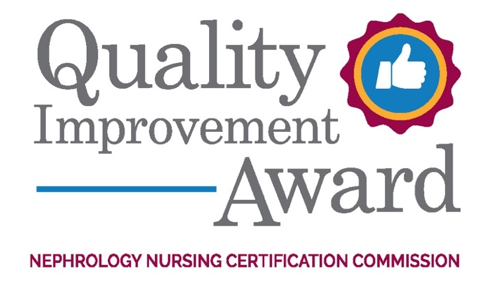 |
NNCC Presents...
Your Stories
|
 |
NNCC launched the “Your Stories” series to help our certificants get recognized for all they do as certified dialysis providers and to build connections within our professional community.
|
Motivated to Learn: One CCHT-A’s Success Story
|
|
|
|
|
This month, we are featuring Jennifer Barker, CCHT-A, of Asheville, NC. Jennifer’s dialysis technician career was set in motion at age 20, thanks to a fortuitous breakfast with her best friend. Fueled by her desire to help her patients, she pursued her CCHT-A credential and is a passionate advocate of seeking an advanced practice.
|
|
|
“Challenging your own dialysis knowledge is always valuable. As technicians, we should not take our knowledge for granted,” she says. “Yes, basic knowledge allows us to perform our daily work, but by having extensive knowledge, we become experts in saving lives.”
|
|
|
Certification Testing Resumes for All NNCC Credentials
|
 |
NNCC's testing partner, C-NET has resumed testing (meeting social distancing requirements) in various locations throughout the United States, in accordance with federal and state guidelines, and will continue to add sites as they become available.
Once you have been approved and registered to test, NNCC’s testing company, PSI, will send you a link to active testing locations in your area. Please visit C-NET's COVID-19 Update page for full details.
|
|
|
NNCC Offering 6-Month Grace Period for Recertification Due to COVID-19 Pandemic
|
NNCC will offer a 6-month grace period for all individuals due to recertify in 2020 who have been affected by the COVID-19 pandemic.
This grace period would not extend your certification period, but will allow you to meet your eligibility criteria within 6 months of your certification expiration date.
If you have been affected by the COVID-19 pandemic and were due to recertify your credential in 2020, you may complete the grace period acknowledgement form and submit it along with your complete recertification application and application fee up to 6 months after your certification expiration date. The form is available for download on the NNCC website under 'Recertify' for each certification credential and is only required if you use the grace period.
There will be NO late fee required. The grace period acknowledgement form must be included with your complete recertification application to take advantage of this grace period.
Whether you use the grace period or not, your certification period and expiration date do not change. No contact hours that were used to recertify the credential during the grace period may be reused to meet requirements during your next certification period.
|
|
|
Congratulations!
Announcing the 2020 Mobility Scholarship Recipients
|
 |
Each year, NNCC awards up to five Career Mobility Scholarships to support a qualified CCHT®, CCHT-A®, and/or a CD-LPN®/CD-LVN® certified individual in continuing education and development or support of a program to improve patient outcomes in the health science field.
Congratulations to our 2020 Clinical/Technical Career Mobility Scholarship Recipients:
- Lyndsay E. Brewer, Amarillo, TX
- Ashley S. Matthews, Baton Rouge, LA
- Bailey J. Herrman, Rose Hill, KS
- Ethan M. Wyse, Kansas City, MO
|
|
|
|
|
 |
Quality is your paramount goal, and NNCC wants to reward you for it. The NNCC Quality Improvement Award is given to an individual or organization for participating in a quality improvement project that promotes optimal patient outcomes in nephrology. The recipient will receive $1,000, national recognition, and a personally delivered engraved plaque during an awards ceremony. Submit the electronic application before June 15, 2020.
|
|
|
|
| |
|
Take the NNCC May Pop Quiz
|
 |
The May “NNCC Question of the Month” is for dialysis nurses and is posted on the NNCC Facebook page. You’ll get a list of options, an explanation for the correct answer, and reference information. You can also go right to the survey here.
Bonus questions!
You’re not done yet! Here are a few more questions. Take them yourself and share with your colleagues.
|
|
| |
 |
 |
|
COVID-19 Patients are Becoming Kidney Patients but Most Americans Unaware
According to a recent poll, most Americans are not aware that COVID-19 doesn't just attack a patient's lungs, it also can damage kidneys. (National Kidney Foundation; 5/15/20)
|
|
CDC: Special Considerations for Patients on Dialysis
Patients on dialysis may be at higher risk for more severe disease from SARS-CoV-2, the virus that causes COVID-19. Facilities should educate patients on prevention strategies including hand hygiene, respiratory hygiene, and cough etiquette. Home dialysis patients should also be educated on safe procedures during routine follow-up visits. (CDC; 5/18/20)
|
|
Racial, Economic Disparities Stark In Data On NYC Deaths
Data released on May 18 reinforced earlier revelations that African American and Hispanic New Yorkers were more than twice as likely to be killed by the coronavirus as white people. (Kaiser Health News; 5/19/20)
|
|
COVID-19: Implications for Immunosuppression in Kidney Disease and Transplantation
The COVID-19 pandemic poses important challenges to the care of patients with immune-mediated kidney diseases and to kidney transplant recipients. This article explores the management of immunosuppression for these patients and suggests potential approaches that could be considered in the absence of validated strategies. (Nature Reviews Nephrology; 5/14/20)
|
| |
 |
 |
|
|
Managing Workplace Fatigue
With health care workers and other first responders stretched thin during the pandemic, the CDC has released a guideline for workers and employers for managing workplace fatigue. (CDC; 5/18/20)
|
|
|
2020’s Best and Worst States for Nurses
Nurses will be in demand as the country adjusts for post-pandemic health care delivery in many settings. This national ranking analyzed key factors and lists the best and worst states to work as a nurse. (WalletHub; 5/4/20)
|
| |
| |